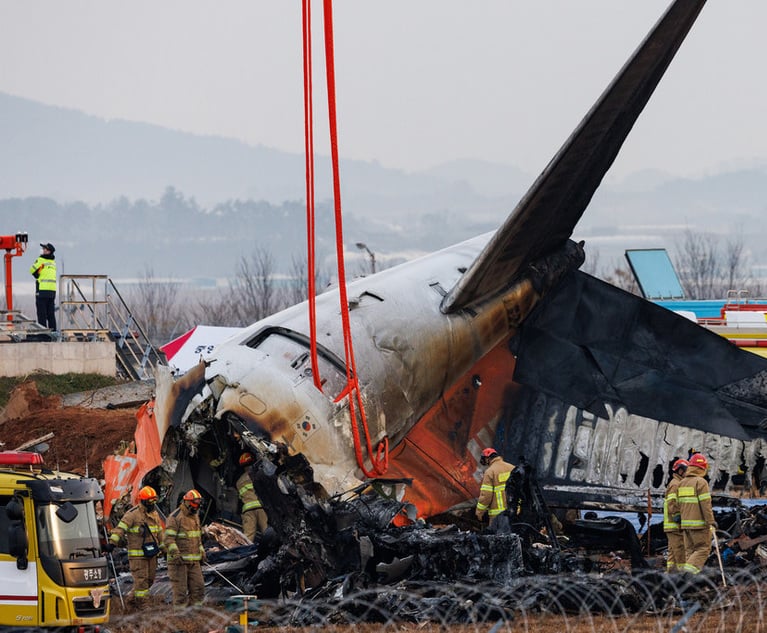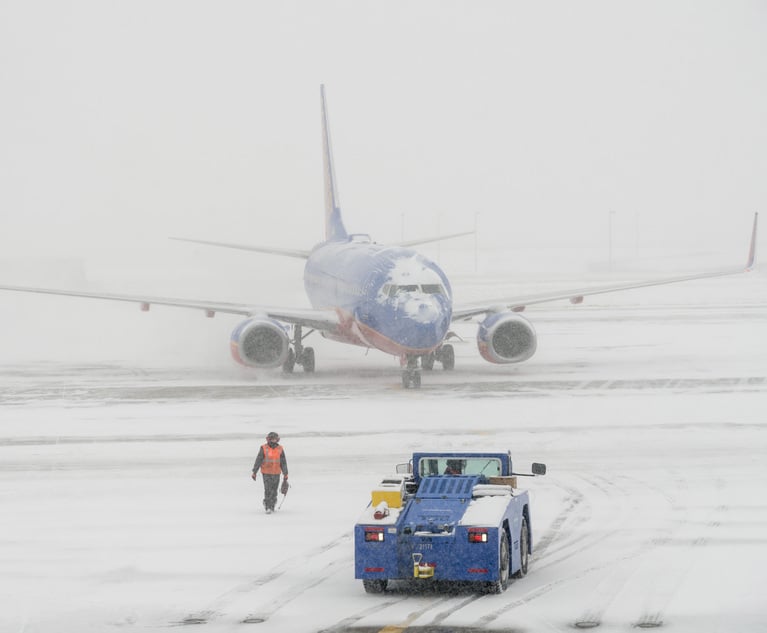 This Boeing 737 Max, taken at Raleigh Durham International Airport, is part of the worldwide grounding due to a safety issue. Credit: John Patota/Shutterstock.com.
This Boeing 737 Max, taken at Raleigh Durham International Airport, is part of the worldwide grounding due to a safety issue. Credit: John Patota/Shutterstock.com. AT&T will postpone new wireless service near some airports planned for this week after the nation's largest airlines said the service would interfere with aircraft technology and cause massive flight disruptions.
The company said Tuesday it would delay turning on new cell towers around runways at some airports — it did not say how many — and work with federal regulators to settle a dispute over potential interference from new 5G service.
The decision came after the airline industry raised the stakes in a showdown with AT&T and Verizon over plans to launch new 5G wireless service this week, warning that thousands of flights could be grounded or delayed if the rollout takes place near major airports.
Verizon and a trade group for the telecom industry, CTIA, did not immediately respond to requests for comment.
On Monday, CEOs of the nation's largest airlines said that interference from the wireless service will be worse than they originally thought.
"To be blunt, the nation's commerce will grind to a halt" unless the service is blocked near major airports, the CEOs said in a letter Monday to federal officials including Transportation Secretary Pete Buttigieg, who has previously taken the airlines' side in the matter.
The airlines asked that the new, faster mobile service be banned within two miles of runways.
AT&T and Verizon planned to activate their new 5G wireless service Wednesday after two previous delays from the original plan for an early December rollout.
The new high-speed 5G service uses a segment of the radio spectrum that is close to that used by altimeters, which are devices that measure the height of aircraft above the ground. Pilots use altimeters to land when visibility is poor, and they link to other systems on planes.
AT&T and Verizon say their equipment will not interfere with aircraft electronics, and that the technology is being safely used in many other countries.
However, the CEOs of 10 passenger and cargo airlines including American, Delta, United and Southwest say that 5G will be more disruptive than they originally thought because dozens of large airports that were to have buffer zones to prevent 5G interference with aircraft will still be subject to flight restrictions announced last week by the Federal Aviation Administration. They add that those restrictions won't be limited to times when visibility is poor.
"Unless our major hubs are cleared to fly, the vast majority of the traveling and shipping public will essentially be grounded. This means that on a day like yesterday, more than 1,100 flights and 100,000 passengers would be subjected to cancellations, diversions or delays," the CEOs said.
The airline CEOs asked that the new 5G be barred within two miles of airport runways.
The showdown between two industries and their rival regulators — the FAA and the Federal Communications Commission, which oversees radio spectrum — now threatens to further disrupt the aviation industry, which has been hammered by the pandemic for nearly two years.
This was a crisis that was years in the making.
The airline industry and the FAA say that they have tried to raise alarms about potential interference from 5G C-Band but the FCC has ignored them.
The telecoms, the FCC and their supporters argue that C-Band and aircraft altimeters operate far enough apart on the radio spectrum to avoid interference. They also say that the aviation industry has known about C-Band technology for several years but did nothing to prepare — airlines chose not to upgrade altimeters that might be subject to interference, and the FAA failed to begin surveying equipment on planes until the last few weeks.
After rival T-Mobile got what is called midband spectrum from its acquisition of Sprint, AT&T and Verizon spent tens of billions of dollars for C-Band spectrum in a government auction run by the FCC to shore up their own mid-band needs, then spent billions more to build out new networks that they planned to launch in early December.
In response to concern by the airlines, however, they agreed to delay the service until early January.
Late on New Year's Eve, Buttigieg and FAA Administrator Stephen Dickson asked the companies for another delay, warning of "unacceptable disruption" to air service.
AT&T CEO John Stankey and Verizon CEO Hans Vestberg rejected the request in a letter that had a scolding, even mocking tone. But they had second thoughts after intervention that reached the White House. They agreed to the second, shorter delay but implied that there would be no more compromises.
That was followed by a deal in which the telecoms agreed to reduce the power of their networks near 50 airports for six months, similar to wireless restrictions in France. In exchange, the FAA and the Transportation Department promised not to further oppose the rollout of 5G C-Band.
President Joe Biden praised the deal, but the airlines weren't satisfied with the agreement, regarding it as a victory for the telecoms that didn't adequately address their concerns about trying to land planes at airports where the new service would be active.
David Koenig reports for the Associated Press. Tali Arbel contributed to this report.
NOT FOR REPRINT
© 2025 ALM Global, LLC, All Rights Reserved. Request academic re-use from www.copyright.com. All other uses, submit a request to [email protected]. For more information visit Asset & Logo Licensing.
You Might Like
View All
Forum Clause Axes $844M Case Against Reinsurer Over Deadly Plane Crash, Judge Rules

Aviation Attorney and Pilot Analyzes Jeju Air Crash, Potential Litigation Issues

Southwest Airlines Faces $100M Class Action Over Pay Periods

Trending Stories
- 1Munger, Gibson Dunn Billed $63 Million to Snap in 2024
- 2January Petitions Press High Court on Guns, Birth Certificate Sex Classifications
- 3'A Waste of Your Time': Practice Tips From Judges in the Oakland Federal Courthouse
- 4Judge Extends Tom Girardi's Time in Prison Medical Facility to Feb. 20
- 5Supreme Court Denies Trump's Request to Pause Pending Environmental Cases
Who Got The Work
J. Brugh Lower of Gibbons has entered an appearance for industrial equipment supplier Devco Corporation in a pending trademark infringement lawsuit. The suit, accusing the defendant of selling knock-off Graco products, was filed Dec. 18 in New Jersey District Court by Rivkin Radler on behalf of Graco Inc. and Graco Minnesota. The case, assigned to U.S. District Judge Zahid N. Quraishi, is 3:24-cv-11294, Graco Inc. et al v. Devco Corporation.
Who Got The Work
Rebecca Maller-Stein and Kent A. Yalowitz of Arnold & Porter Kaye Scholer have entered their appearances for Hanaco Venture Capital and its executives, Lior Prosor and David Frankel, in a pending securities lawsuit. The action, filed on Dec. 24 in New York Southern District Court by Zell, Aron & Co. on behalf of Goldeneye Advisors, accuses the defendants of negligently and fraudulently managing the plaintiff's $1 million investment. The case, assigned to U.S. District Judge Vernon S. Broderick, is 1:24-cv-09918, Goldeneye Advisors, LLC v. Hanaco Venture Capital, Ltd. et al.
Who Got The Work
Attorneys from A&O Shearman has stepped in as defense counsel for Toronto-Dominion Bank and other defendants in a pending securities class action. The suit, filed Dec. 11 in New York Southern District Court by Bleichmar Fonti & Auld, accuses the defendants of concealing the bank's 'pervasive' deficiencies in regards to its compliance with the Bank Secrecy Act and the quality of its anti-money laundering controls. The case, assigned to U.S. District Judge Arun Subramanian, is 1:24-cv-09445, Gonzalez v. The Toronto-Dominion Bank et al.
Who Got The Work
Crown Castle International, a Pennsylvania company providing shared communications infrastructure, has turned to Luke D. Wolf of Gordon Rees Scully Mansukhani to fend off a pending breach-of-contract lawsuit. The court action, filed Nov. 25 in Michigan Eastern District Court by Hooper Hathaway PC on behalf of The Town Residences LLC, accuses Crown Castle of failing to transfer approximately $30,000 in utility payments from T-Mobile in breach of a roof-top lease and assignment agreement. The case, assigned to U.S. District Judge Susan K. Declercq, is 2:24-cv-13131, The Town Residences LLC v. T-Mobile US, Inc. et al.
Who Got The Work
Wilfred P. Coronato and Daniel M. Schwartz of McCarter & English have stepped in as defense counsel to Electrolux Home Products Inc. in a pending product liability lawsuit. The court action, filed Nov. 26 in New York Eastern District Court by Poulos Lopiccolo PC and Nagel Rice LLP on behalf of David Stern, alleges that the defendant's refrigerators’ drawers and shelving repeatedly break and fall apart within months after purchase. The case, assigned to U.S. District Judge Joan M. Azrack, is 2:24-cv-08204, Stern v. Electrolux Home Products, Inc.
Featured Firms
Law Offices of Gary Martin Hays & Associates, P.C.
(470) 294-1674
Law Offices of Mark E. Salomone
(857) 444-6468
Smith & Hassler
(713) 739-1250






